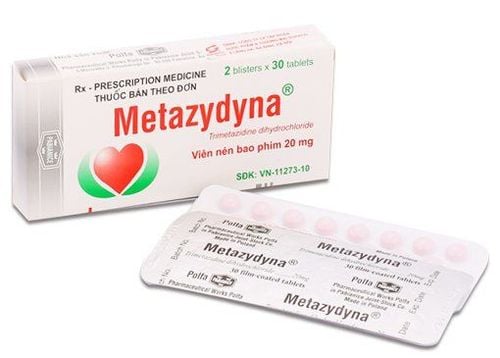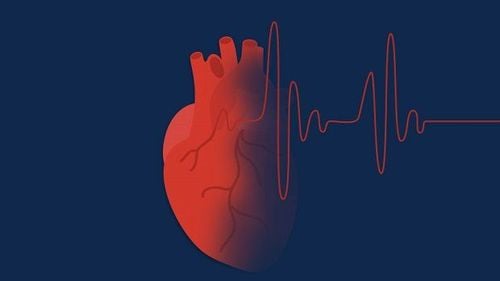This is an automatically translated article.
The article was professionally consulted by Doctor General Internal Medicine Doctor - Department of Medical Examination & Internal Medicine - Vinmec Hai Phong International General Hospital. The doctor has more than 30 years of experience in the field of internal medicine.
Atrioventricular block is a condition in which the system that conducts electrical impulses in the heart from the atria to the ventricles is disrupted. Atrioventricular block is classified into 3 different grades, of which first-degree AV block is the mildest. So is 1st degree atrioventricular block dangerous?
1. Normal electrophysiology of the heart and electrocardiogram
The heart is the most important organ of the body, acting as a pump, both sucking oxygen-poor blood for exchange in the lungs, and pumping oxygen-rich blood to supply the activities of other organs.
To work effectively, the heart needs to work according to a rhythmic electrical conduction mechanism from the sinus node, atria to the ventricles, through the pacemaker nodes and the electrical impulse conduction system of the fibers. heart muscle.
In the normal person, the sinus node is the site of the first electrical impulse and conducts it through the atria. At that time, the image shown on the electrocardiogram is the image of the P wave. Then, the electrical impulse from the atria travels down to the ventricles through the atrioventricular node.
Next, the electrical impulse is conducted through the entire ventricle through the His system and Purkinje fibers, represented on the electrocardiogram by the QRS complex. Finally, the myocardium will repolarize to start a new cycle and the ECG will pick up a T wave.
2. What is 1st degree AV block?
Atrioventricular block is a condition in which the system that carries electrical impulses from the atria to the ventricles is disrupted, causing the heart to beat slower than normal or a more serious arrhythmia. In particular, first-degree atrioventricular block is when the electrical impulse is still conducted from the atria, through the atrioventricular node and down to the ventricles, but at this time the conduction time is slower than normal.
The electrocardiogram criterion for first-degree AV block is a PR interval (or PQ) >0.2 seconds (5 small plots on the electrocardiogram). Block is considered most obvious when PR interval > 0.3 seconds and sometimes P wave will appear hidden in T wave of previous cycle.

3. Causes of 1 degree atrioventricular block
There are many possible causes that affect the conduction of electrical impulses through the AV node and cause first-degree AV block. Some common causes include:
Congenital or degenerative processes due to advanced age. Myocardium is damaged by surgery, after a heart attack, or by other cardiovascular diseases. Hypothyroidism causes a decrease in thyroid hormone in the body. Disturbances of electrolyte balance, especially potassium deficiency. Inflammation or infection of the heart muscle. Rheumatic heart disease, rheumatism. Side effects of some medications affect heart rate. A few are due to genetics Besides, a group of subjects who are also prone to forming first-degree atrioventricular block are professional athletes, because of exercise, their heart rate is often slower than normal. However, this is considered normal and rarely causes dangerous complications.
4. What are the symptoms of first-degree AV block?
Most patients with first-degree AV block do not have any specific symptoms. The detection of the disease is only by chance when the electrocardiogram is measured during a routine physical examination or when the patient is admitted to the hospital for another medical condition.
A few cases when first-degree atrioventricular block makes the heart beat slower than normal (less than 60 beats/minute), the patient sometimes feels dizzy, light-headed when active or exerted due to the amount of blood. insufficient supply to the brain.

5. Is 1st degree AV block dangerous?
First degree atrioventricular block is the mildest form of the disease, has not caused any symptoms and does not affect the hemodynamics of the patient, so it does not pose much danger to the patient's health.
However, over time, complete grade 1 atrioventricular block can progress to more severe levels such as grade 2, grade 3 and then cause many dangerous complications to the patient's cardiovascular health. .
Therefore, patients should not be subjective, need periodic health check-ups for early detection and treatment according to the regimen, as well as implementation of monitoring and preventive measures to prevent the disease from progressing worse. importance.
6. Treatment of 1 degree atrioventricular block
Usually, most cases of first-degree atrioventricular block do not require specific treatment. Doctors only ask patients to monitor their health, perform regular physical examinations to detect changes in heart rate and electrocardiogram. Patients will be taught how to monitor their heart rate to detect heart rhythm abnormalities early and to see a doctor when necessary.
Some patients who have been diagnosed with first-degree AV block if suddenly feel tired, dizzy, light-headed or faint, need to see a doctor immediately for an accurate diagnosis and prompt treatment. , to avoid disease progression.
In addition to the treatment related to arrhythmia, patients with first degree atrioventricular block should be monitored and controlled appropriately, do not smoke, drink alcohol, and have a diet that minimizes oil. Fat, eat lots of green vegetables.
In addition, should increase gentle exercise every day as well as do not work too hard or too hard to avoid affecting cardiovascular health.

Vinmec International General Hospital is the address for examination, treatment and prevention of diseases, including Cardiology. When performing the examination process at Vinmec, customers will be welcomed and used the modern facilities and machinery system along with perfect medical services under the guidance and advice of the doctors. Good doctors, well-trained both at home and abroad.
Please dial HOTLINE for more information or register for an appointment HERE. Download MyVinmec app to make appointments faster and to manage your bookings easily.













